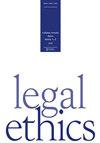Ethics and the law: an introduction
IF 0.3
Q1 LAW
引用次数: 2
Abstract
‘Legal ethics’ is a broad church, embracing the legal regulation of lawyers as well as the empirical, historical, sociological and – since the mid-1970s – philosophical study of legal practice. Ethics and the Law is the first book-length introduction to this last, philosophical, thread. Brad Wendel is a singularly appropriate author for such an introduction. He is a lawyer and a philosopher, a leading contributor to contemporary philosophical legal ethics, and he writes clearly and engagingly. Ethics and the Law is divided into two parts. The first part introduces a range of philosophical issues raised by the ethical analysis of legal practice; the idea of role differentiation; reflective equilibrium and the form of common justifications of legal practice; the justification of the legal system itself, particularly the adversary system; connections between leading positions in the philosophy of law and legal ethics; questions about the relationship between citizens and government and the notions of obligation and obedience; and the challenge of unjust laws. The second part is motivated by appreciation that the role of lawyer is not monolithic: there are many ‘law jobs’ – lawyers work as criminal defenders, as prosecutors, within civil litigation, as in-house or company counsel, representing clients in courts or as adviser or counsel in matters never likely to be independently examined, and so on. These roles raise distinct ethical issues that are identified and discussed in chapters dedicated to each of the selected law jobs. This is for the most part a very good introduction. The book displays its author’s mastery of an impressive range of material. It includes engaging and deeply troubling cases, such as the one it starts with, in which client confidentiality leads lawyers to sit on a confession that might have spared an innocent man 25 years in prison, gives a sense how justification might proceed in applied ethics, and in legal ethics in particular, and draws connections between legal ethics and broader philosophical issues. The chapters on the multiple roles of lawyers in the second part are both nuanced treatments in their own right and an important reminder of the need for proper regard to the detail of particular roles within law. Too many write as though all lawyers work in court, or deep in the shadow of litigation. Wendel’s introduction is a reminder that that is not so, and why it matters. Inevitably, there are quibbles. The authors of introductory texts tread a fine line when drawing connections between their topics and broader issues: the connections can enrich new readers’ understanding of the core topic, or puzzle and confuse. Mainly, I think Wendel gets it right but occasionally he delivers a perfectly good introduction to some aspect of social or moral philosophy without making its connections to legal ethics very clear. Chapter 4, on the philosophy of law, is a useful primer on legal positivism and natural law theory, for instance (though the omission of legal realism at this point is curious, since the view has been an influential foil in legal ethics), but the discussion turns to legal ethics only very late in the piece. Chapter 5 introduces a range of views about伦理与法律:导论
“法律伦理”是一个广泛的教会,包括律师的法律规范以及经验,历史,社会学和-自20世纪70年代中期以来-法律实践的哲学研究。《伦理与法律》是对这最后一个哲学线索的第一本书长度的介绍。布拉德·温德尔(Brad Wendel)是一个非常适合做这种介绍的作者。他是一名律师和哲学家,是当代哲学法律伦理学的主要贡献者,他的作品清晰而引人入胜。《道德与法律》分为两部分。第一部分介绍了法律实践中伦理分析所引发的一系列哲学问题;角色分化思想;反思性平衡与法律实践的共同正当性形式法律制度本身的正当性,特别是对抗性制度的正当性;法哲学与法律伦理的领导地位公民与政府之间的关系以及义务和服从的概念;以及不公正法律的挑战。第二部分的动机是认识到律师的角色不是单一的:有许多“法律工作”-律师担任刑事辩护人,检察官,民事诉讼,内部或公司律师,在法庭上代表客户,或在永远不可能独立审查的事项上担任顾问或律师,等等。这些角色提出了不同的道德问题,这些问题在专门针对每个选定的法律工作的章节中进行了识别和讨论。这在很大程度上是一个很好的介绍。这本书显示了作者对一系列令人印象深刻的材料的掌握。它包括引人入胜且令人深感不安的案例,比如它开头提到的那个,在这个案例中,客户保密导致律师隐瞒了一份可能会让一个无辜的人免于25年监禁的供词,它让人们了解了在应用伦理学中,尤其是在法律伦理学中,辩护可能如何进行,并将法律伦理学与更广泛的哲学问题联系起来。第二部分中关于律师多重角色的章节,都是对其自身权利的细致处理,也是对法律中特定角色细节的适当考虑的重要提醒。太多的人写得好像所有的律师都在法庭上工作,或者深陷于诉讼的阴影中。温德尔的介绍提醒我们,事实并非如此,为什么这很重要。不可避免地,存在一些微妙之处。介绍性文章的作者在主题和更广泛的问题之间建立联系时,总是小心翼翼:这种联系可以丰富新读者对核心主题的理解,或者让他们感到困惑和困惑。总的来说,我认为温德尔的观点是正确的,但他偶尔也会很好地介绍社会或道德哲学的某些方面,但却没有把它们与法律伦理联系得很清楚。例如,关于法律哲学的第4章是关于法律实证主义和自然法理论的有用入门(尽管在这一点上遗漏法律现实主义是奇怪的,因为这种观点一直是法律伦理学的一个有影响力的陪饰),但讨论只在很晚的时候才转向法律伦理学。第五章介绍了一系列关于
本文章由计算机程序翻译,如有差异,请以英文原文为准。
求助全文
约1分钟内获得全文
求助全文

 求助内容:
求助内容: 应助结果提醒方式:
应助结果提醒方式:


